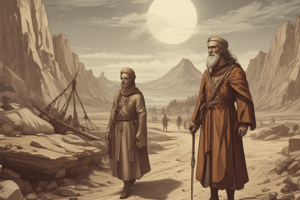Podcast
Questions and Answers
When did the Renaissance period begin?
When did the Renaissance period begin?
- 14th century (correct)
- 5th century
- 17th century
- 15th century
Which event marked the beginning of the Age of Discovery?
Which event marked the beginning of the Age of Discovery?
- The Black Death
- Exploration of new worlds (correct)
- The Renaissance
- The Crusades
What defined the 20th century according to the text?
What defined the 20th century according to the text?
- Totalitarian regimes (correct)
- Renaissance art
- Black Death
- Age of Enlightenment
Which era introduced rational thinking and political reforms?
Which era introduced rational thinking and political reforms?
What characterized the Industrial Revolution?
What characterized the Industrial Revolution?
Which event challenged and reshaped the world in the 21st century?
Which event challenged and reshaped the world in the 21st century?
When did Homo sapiens emerge?
When did Homo sapiens emerge?
Which era saw the transition from nomadic hunter-gatherer societies to farming communities?
Which era saw the transition from nomadic hunter-gatherer societies to farming communities?
Which ancient civilizations set the foundations for the Classical Age?
Which ancient civilizations set the foundations for the Classical Age?
What marked the Golden Age of Athens and Rome?
What marked the Golden Age of Athens and Rome?
Which species developed tools and mastered fire approximately 2.3 million years ago?
Which species developed tools and mastered fire approximately 2.3 million years ago?
What led to a population explosion after the transition from hunter-gatherer societies to farming communities?
What led to a population explosion after the transition from hunter-gatherer societies to farming communities?
Flashcards are hidden until you start studying
Study Notes
Exploring Human History: A Timeline of Discovery and Progress
Throughout the eons, the human story has unfolded in a mesmerizing tapestry of moments, events, and innovations. To comprehend our collective past, let's embark on a journey that spans from the dawn of our species to the technological age, embracing the significant milestones that define our existence.
The Beginnings: Hominids and Homo Sapiens
Our origins can be traced back to around 2.8 million years ago when the first hominids emerged in Africa. The genus Homo appeared approximately 2.3 million years ago, with species such as Homo habilis and Homo ergaster developing tools and mastering fire. Homo sapiens, our immediate ancestors, emerged around 200,000 years ago.
The Neolithic Revolution, lasting from around 8,000 BCE to 4,000 BCE, marked a pivotal moment in human history as we transitioned from nomadic hunter-gatherer societies to farming communities. This transition paved the way for the development of cities, trade, and a surplus of food, leading to a population explosion.
The Classical Age: Civilizations and Empires
The ancient civilizations of Sumerians, Phoenicians, and Indus Valley inhabitants set the foundations for the Classical Age. The Greek and Roman empires, flourishing from the 7th century BCE to the 5th century CE, ushered in the Golden Age of Athens and Rome. During this period, significant advancements in philosophy, mathematics, and literature took place.
The Middle Ages: Dark Ages, Renaissance, and Enlightenment
The Middle Ages, spanning from the 5th to the 15th century, were marked by the rise and fall of medieval kingdoms, the Crusades, and the Black Death. However, the Renaissance, beginning in the 14th century, signified a rebirth of classical learning and arts. The Age of Discovery, commencing in the 15th century, brought about the exploration of new worlds.
The Age of Enlightenment, beginning in the 17th century, introduced rational thinking and political reforms, leading to the American Revolution and the French Revolution.
The 19th and 20th Centuries: Industrialization and Modernization
The Industrial Revolution, beginning in the late 18th century, heralded the age of machines, factories, and mass production. The 20th century witnessed world wars, the rise of totalitarian regimes, and the Civil Rights movement. The Cold War, lasting from 1947 to 1991, defined the geopolitical landscape of the era, while the Space Age introduced the first human to orbit the Earth.
The 21st Century: Globalization and Technological Advancements
The 21st century has seen the emergence of the digital age, artificial intelligence, and the rise of global powers. The 9/11 attacks, the Global Financial Crisis, and the ongoing climate crisis have challenged and reshaped our world.
Human history is a complex tapestry encompassing countless moments of discovery and progress. By understanding our past, we can gain insight into the present and shape a more promising future. As we delve deeper into our history, we unearth the unbreakable bond between our ancestors and ourselves, forging a connection that transcends time.
Studying That Suits You
Use AI to generate personalized quizzes and flashcards to suit your learning preferences.




